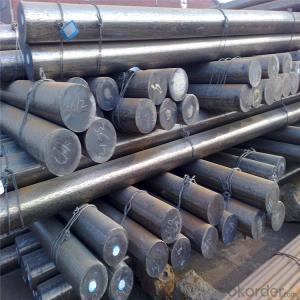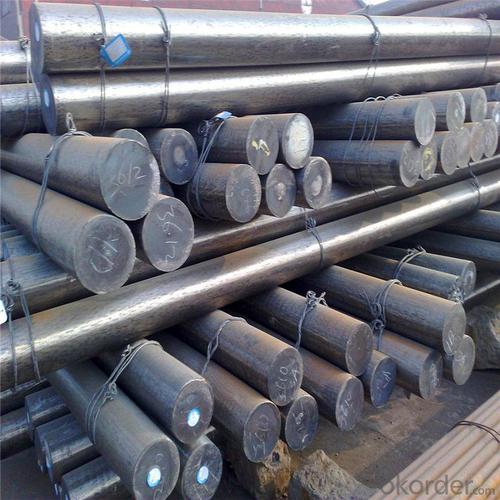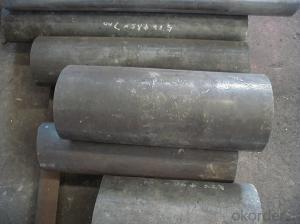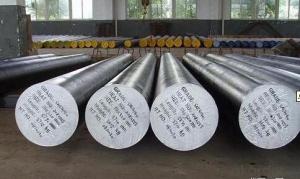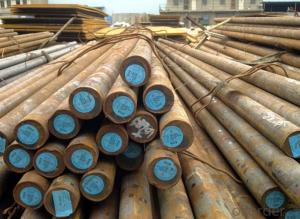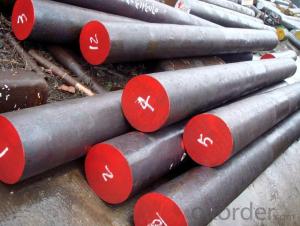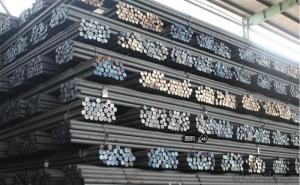DIN1.7225 Alloy Steel Round/Flat/Squar Bar Forged
- Loading Port:
- Tianjin
- Payment Terms:
- TT OR LC
- Min Order Qty:
- 100 m.t.
- Supply Capability:
- 50000 m.t./month
OKorder Service Pledge
OKorder Financial Service
You Might Also Like
Specification
DIN1.7225 Alloy Steel Round/Flat/Squar Bar Forged
Product Description of DIN1.7225 Alloy Steel Round/Flat/Squar Bar Forged
1. Steel grade: ASTM4140, SCM440, 42CrMo, DIN1.7225
2. Length: 6M-12M
3. Diameter: 16mm-300mm
4. Product range: round bar, flat bar, square bar
5. Technique: Hot rolled, forged, cold drawn
Specification of DIN1.7225 Alloy Steel Round/Flat/Squar Bar Forged
Material | ASTM4140 | Round bar | Dia(mm) | 16-300mm |
Process | EAF + LF + VD + Forged + Heat Treatment (optional) | Length (mm) | Max 12m | |
Heat treatment | Normalized / Annealed / Quenched / tempered | Flat bar | Thickness(mm) | 8-500mm |
Delivery condition | Hot forged +Rough machined (black surface after Q/T)+ Turned (optional) | Width(mm) | 70-200mm | |
Test | Ultrasonic test according to SEP 1921-84 D/d | Length (mm) | Max 12m |
Chemical Composition of DIN1.7225 Alloy Steel Round/Flat/Squar Bar Forged
C | Si | Mn | Cr | Mo | P | S |
0.38~0.43 | 0.15~0.35 | 0.75~1.00 | 0.8~1.1 | 0.15~0.25 | ≤0.035 | <0.04< td=""> |
Photo Show of DIN1.7225 Alloy Steel Round/Flat/Squar Bar Forged
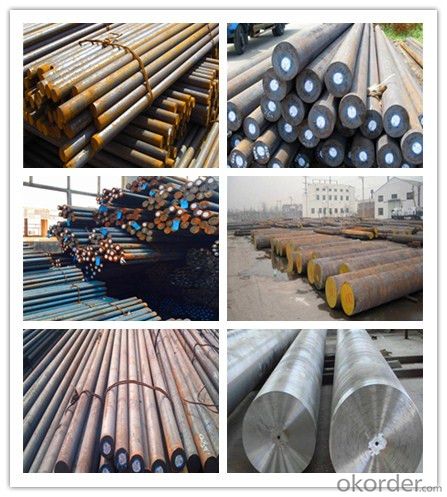
Packing and Delivery:
Packing in bundle package, or as customer's requirements.
Delivery Detail: 45 days after receiving the deposit.
Usage and Applications of DIN1.7225 Alloy Steel Round/Flat/Squar Bar Forged
1. Steel round bar is used in a large number of architectural and engineering structures. Or it can be used in construction of plants for the production of steel house frames, high-voltage transmission towers, bridges, vehicles, boilers, containers, ships, etc.
2. And we can use this kind of product on the performance of the mechanical parts if the demand is not very high.
3. Some special material steel round bar can be used for main shaft of steamer, hummer shank, with big section and supper force.
Company Information
CNBM International Corporation is the most important trading platform of CNBM group.
Whith its advantages, CNBM International are mainly concentrate on Cement, Glass, Iron and Steel, Ceramics industries and devotes herself for supplying high qulity series of refractories as well as technical consultancies and logistics solutions.


F A Q
1, Your advantages?
professional products inquiry, products knowledge train (for agents), smooth goods delivery, excellent customer solution proposale
2, Test & Certificate?
SGS test is available, customer inspection before shipping is welcome, third party inspection is no problem
3, Factory or Trading Company?
CNBM is a trading company but we have so many protocol factories and CNBM works as a trading department of these factories. Also CNBM is the holding company of many factories.
4, Payment Terms?
30% TT as deposit and 70% before delivery.
Irrevocable L/C at sight.
5, Trading Terms?
EXW, FOB, CIF, FFR, CNF
6, After-sale Service?
CNBM provides the services and support you need for every step of our cooperation. We're the business partner you can trust.
For any problem, please kindly contact us at any your convenient time.
We'll reply you in our first priority within 24 hours.
- Q: Can steel round bars be hardened or tempered?
- Yes, steel round bars can be hardened or tempered.
- Q: How do you straighten a bent steel round bar?
- To straighten a bent steel round bar, you can use either a hydraulic press or a mechanical straightening machine. The process involves applying gradual pressure to the bent area until it becomes straight again. It is important to ensure even pressure distribution to avoid further damage to the bar.
- Q: What are the different types of surface defects that can occur in steel round bars?
- Steel round bars can experience multiple types of surface defects. Some of the most frequently encountered defects include the following: 1. Scratches: These shallow grooves or marks on the round bar's surface occur due to friction or contact with sharp objects during handling or transportation. 2. Pitting: Small, localized cavities or depressions on the surface are caused by corrosion or exposure to harsh environments. If left unaddressed, pitting can lead to further corrosion. 3. Scale: During the manufacturing process, a thin layer of oxide or impurities, known as scale, can form on the surface of steel round bars. Although it affects appearance and quality, scale is often removed during subsequent processing or cleaning. 4. Scabs: Irregularly shaped protrusions or raised areas on the surface result from solidification or cooling issues during the casting process. Proper attention is required to ensure the strength and integrity of the bar. 5. Roll marks: Elongated depressions or ridges on the surface are caused by uneven or improper rolling during manufacturing. Roll marks can impact the dimensional accuracy of the bar and may necessitate additional processing or grinding for removal. 6. Laminations: Sometimes visible on the surface, laminations are internal defects resulting from improper bonding or separation of layers during the steelmaking process. They can weaken the bar and reduce its load-bearing capacity. 7. Inclusions: Non-metallic particles or impurities can become trapped in the steel during manufacturing, appearing as dark spots or irregularities on the round bar's surface. Inclusions can affect the bar's mechanical properties. It is essential to recognize that the severity and impact of these surface defects may vary. Manufacturers and quality control personnel employ diverse inspection techniques to identify and mitigate these defects, ensuring the quality and reliability of the final product.
- Q: Are steel round bars magnetic?
- Yes, steel round bars are generally magnetic due to their high iron content.
- Q: Are steel round bars suitable for marine environments?
- Yes, steel round bars can be suitable for marine environments, but it depends on the specific type of steel used and the conditions of the marine environment. Stainless steel is often the preferred choice for marine applications due to its excellent corrosion resistance properties. Stainless steel contains chromium, which forms a protective layer on the surface of the steel, preventing corrosion and rusting. However, not all steel round bars are suitable for marine environments. Carbon steel, for example, is more susceptible to corrosion in marine environments, especially in the presence of saltwater. Carbon steel should be carefully protected with coatings or treatments to prevent corrosion. Additionally, the conditions of the marine environment also play a significant role in determining the suitability of steel round bars. Factors such as the salinity of the water, exposure to chemicals, temperature variations, and physical stress can affect the corrosion resistance of steel. In highly corrosive marine environments, it is advisable to use specialized marine-grade stainless steel or other corrosion-resistant alloys. Ultimately, it is crucial to select the appropriate grade of steel and consider additional protective measures, such as coatings or galvanization, to enhance the durability and longevity of steel round bars in marine environments.
- Q: Can steel round bars be used in the production of sporting goods?
- Sporting goods can indeed utilize steel round bars. Steel, a versatile material renowned for its strength and durability, proves fitting for a wide spectrum of applications within the sporting goods industry. To illustrate, steel round bars can be employed to fabricate various components, including shafts, handles, frames, and supports for sporting equipment such as golf clubs, hockey sticks, weightlifting bars, and exercise machines. The robust tensile strength of steel ensures that these components can withstand the rigorous forces and pressures exerted during sports activities, thus affording stability and longevity to the resultant products. Additionally, steel round bars can be effortlessly machined, welded, and molded into different shapes and sizes to meet the particular requirements of each sporting good. Furthermore, steel's ability to resist corrosion renders it an ideal choice for outdoor sporting equipment that is subjected to diverse weather conditions. In summary, steel round bars are an immensely popular option in the production of sporting goods owing to their strength, durability, versatility, and capacity to endure the demands of various sports.
- Q: What are the different types of steel round bar surface finishes?
- The different types of steel round bar surface finishes include hot rolled, cold rolled, turned and polished, and ground.
- Q: Can steel round bars be used for making staircases?
- Yes, steel round bars can be used for making staircases. They provide durability, strength, and a modern aesthetic appeal to the staircase design.
- Q: What is the maximum aluminum content allowed for steel round bars?
- The maximum aluminum content allowed for steel round bars typically varies depending on the specific industry standards and specifications. However, a common maximum aluminum content limit for steel round bars is around 0.20-0.35%.
- Q: What are the different treatments available for steel round bars?
- There are several different treatments available for steel round bars, including heat treatment, surface treatment, and coating. Heat treatment involves processes such as annealing, quenching, and tempering to improve the material's strength, hardness, and ductility. Surface treatments, such as polishing, grinding, or shot blasting, are used to enhance the surface finish and remove any imperfections. Coatings, such as galvanizing or painting, provide protection against corrosion and improve the overall appearance of the steel round bars.
Send your message to us
DIN1.7225 Alloy Steel Round/Flat/Squar Bar Forged
- Loading Port:
- Tianjin
- Payment Terms:
- TT OR LC
- Min Order Qty:
- 100 m.t.
- Supply Capability:
- 50000 m.t./month
OKorder Service Pledge
OKorder Financial Service
Similar products
Hot products
Hot Searches
Related keywords
